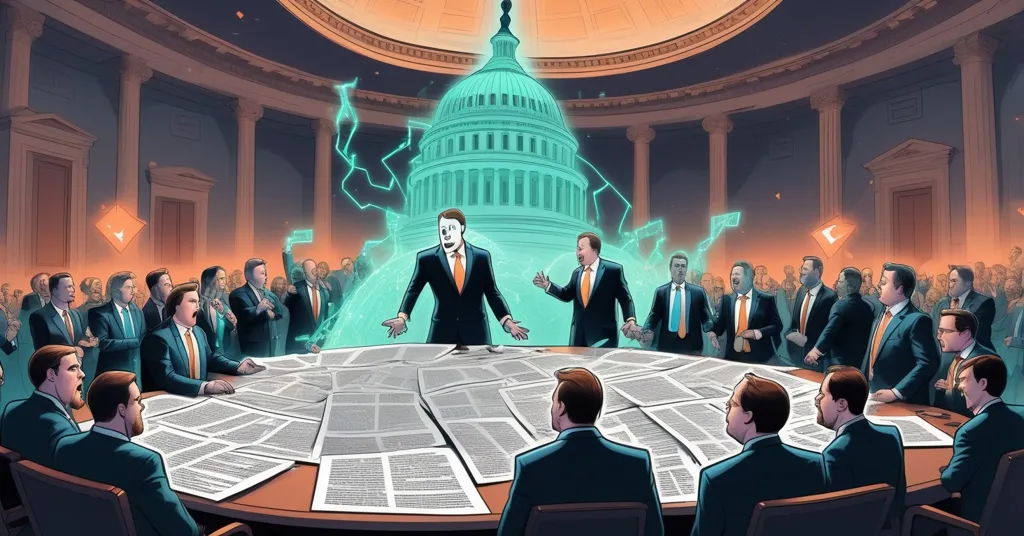Trump’s Tax Bill Drama: How GOP Clash Could Reshape Bitcoin and Crypto Policies

Trump’s Capitol Hill Clash: Tax Bill Showdown Sparks Crypto Policy Speculation
President Donald Trump has summoned a fractured group of House Republicans to the White House, scrambling to unify support for a divisive tax and spending bill before the July 4 holiday deadline. As GOP infighting threatens to derail the legislation, the ripple effects could reach far beyond traditional finance, potentially reshaping the landscape for Bitcoin and cryptocurrency through unexpected tax reforms or economic shifts.
- GOP Fracture: Trump pushes for his “big, beautiful bill” as conservatives and moderates clash over spending cuts and policy impacts.
- Vote Urgency: A procedural vote looms before the holiday, with Speaker Mike Johnson racing to mediate internal revolt.
- Crypto Stakes: Tax changes or economic policies in the bill could directly hit Bitcoin investors and altcoin markets.
A House Divided: GOP Factions at Odds
The tension in Washington is thick as Trump hosted a mix of conservative hardliners from the House Freedom Caucus and more pragmatic moderate Republicans at the White House on Wednesday. The goal? To secure votes for a tax and spending package that’s become a political flashpoint within the Republican Party, as detailed in reports of Trump’s summons to GOP lawmakers. With a critical procedural vote on the horizon—essentially a preliminary step to move the bill forward on Capitol Hill—the stakes couldn’t be higher. Speaker Mike Johnson, caught in the crossfire, stressed the urgency after a grueling 40-minute meeting with conservatives, bluntly stating, “We gotta get this done.” Yet, unity remains elusive, and the cracks in the GOP are glaring.
The core of the conflict lies in the bill’s evolution. After passing through the Senate with significant tweaks, the legislation no longer resembles the version House Republicans initially backed. The House Freedom Caucus, a group known for its staunch fiscal conservatism, is up in arms over what they see as a gutting of spending offsets—budget cuts or savings meant to balance out new expenditures. Their frustration is evident in their strong opposition to the Senate’s Medicaid cuts. Rep. Ralph Norman of South Carolina didn’t hold back, demanding the bill be sent back to the Senate for rework, growling, “I’m done with promises… it’s what the president wants.” Chairman Andy Harris of Maryland piled on, taking a swipe at Trump’s pressure tactics with a sharp, “The White House doesn’t have a voting card.” Adding fuel to their frustration, the Senate’s decision to adjourn has left conservatives fuming, with loud calls to haul senators back to Washington to hash this out.
“Hopefully it goes back to Rules, gets moved closer to the House position, and the Senate gets called back into town.” – Andy Harris, House Freedom Caucus Chairman
Meanwhile, moderate Republicans are balking for entirely different reasons. Lawmakers like Rep. Mike Lawler of New York, David Valadao of California, and Dan Newhouse of Washington represent districts where the bill’s proposed cuts to Medicaid—a joint federal-state program providing healthcare for low-income folks—and the slashing of green energy tax credits sting hard. Valadao, whose constituents heavily depend on Medicaid, drew a firm line, declaring, “I support the reasonable provisions in H.R. 1… but I will not support a final bill that eliminates vital funding streams.” His defiance carries extra weight given his and Newhouse’s history as the only two House Republicans who voted to impeach Trump after the January 6 Capitol riot—a lingering fracture that adds a personal edge to this policy standoff, further highlighted by recent updates on GOP internal conflict over tax legislation.
Johnson’s role as mediator is no enviable task. While he labeled his recent sit-down with conservatives as “productive,” he’s dodged confirming whether the vote will even happen on schedule before the holiday recess. Trump, ever the showman, wants a win to parade as a legislative triumph, but with both wings of his party digging in, the outcome is anyone’s guess. And while this drama unfolds over traditional policy lines, let’s be real: the fallout could creep into corners of finance far removed from Capitol Hill’s marble halls, including the wild, decentralized world of cryptocurrency.
Crypto in the Crosshairs: Why This Matters to Bitcoin and Beyond
For those just dipping their toes into the crypto pool, let’s unpack why a dusty tax bill spat should ping your radar. Bitcoin, the flagship digital currency, and altcoins—alternative cryptocurrencies like Ethereum, Solana, or Cardano—thrive in a market hypersensitive to government policy shifts, especially around taxation and economic conditions. A change in capital gains rules, for instance, could redefine how profits from crypto trades are taxed, as explored in discussions on Trump’s tax bill and its Bitcoin implications. Picture this: you buy Bitcoin at $30,000, sell at $50,000, and pocket a $20,000 gain. If this bill hikes the tax rate on such gains, a bigger slice of your profit vanishes to the IRS. That’s not abstract—it’s your wallet taking the hit.
Beyond direct taxation, broader economic moves in the bill could sway behavior in the crypto space. Cuts to programs like Medicaid might shrink disposable income for everyday folks, curbing their ability to invest in volatile assets like digital currencies. Conversely, if stimulus or tax breaks sneak into the final draft, a flood of cash could fuel speculative buying, pushing Bitcoin prices up temporarily. The specifics of this legislation remain frustratingly vague, but the potential to alter market dynamics is undeniable, with insights available on details of Trump’s 2025 tax and spending bill. And with Trump’s fingerprints all over this push, his track record on crypto adds another layer of uncertainty. Once branding Bitcoin a “scam” in 2021, he’s since flirted with pro-crypto rhetoric during recent campaign stops. So, what’s the play here—hidden incentives for blockchain innovation or a sneaky crackdown cloaked in fiscal reform? Flip a coin, because Washington’s poker face is unreadable.
Historically, U.S. policy has jolted crypto markets before. Take the 2021 Infrastructure Bill, which slapped new reporting requirements on crypto transactions. The mere announcement spooked investors, tanking prices temporarily as fears of overreach spread. If this current tax and spending package harbors similar surprises—say, tighter IRS scrutiny on decentralized finance (DeFi) platforms or harsher penalties for unreported trades—it could chill adoption overnight. On the flip side, a crypto-friendly clause, like tax breaks for blockchain startups, might spark a mini-boom, a topic debated in forums like how Trump’s tax policies could affect crypto. Bitcoin maximalists might scoff, banking on their king coin’s resilience, but even they aren’t immune to policy sucker punches. Altcoin projects, especially in DeFi or staking ecosystems like Ethereum, face unique risks if tax structures start targeting specific activities. It’s a messy chessboard, and we’re all waiting for the next move.
Decentralization Meets Fiscal Hawkishness: An Unlikely Alliance?
Peering through the political smoke, there’s a curious ideological overlap worth chewing on. The House Freedom Caucus’s relentless drive to slash government spending echoes—at least in spirit—the ethos of decentralization that powers Bitcoin and blockchain tech. Their disdain for bloated federal budgets and unchecked overreach isn’t far off from the crypto community’s rebellion against centralized financial systems, often called “fiat dominance” (think government-backed currencies like the dollar ruling the roost). Could these fiscal hawks unexpectedly emerge as allies in pushing for DeFi as a counter to traditional monetary control? Their position on related issues is elaborated in Freedom Caucus views on crypto and tax legislation. It’s a stretch, sure, but not pure fantasy. Imagine a world where their budget-cutting zeal extends to questioning the Federal Reserve’s grip—Bitcoiners might find a friend in strange places.
But let’s pump the brakes. Playing devil’s advocate, even the most anti-spending conservatives often bristle at crypto’s Wild West vibe. Fears of money laundering, tax evasion, or just plain regulatory chaos have historically turned fiscal conservatives into crypto skeptics. Look no further than past GOP-led efforts to tighten oversight on digital assets, citing “national security” concerns. Meanwhile, moderates defending programs like Medicaid embody a pragmatism that mirrors crypto critics who argue for stable, state-backed systems over unproven digital alternatives. This GOP tug-of-war reflects our own industry’s debates: freedom versus regulation, innovation versus stability. It’s a mirror held up to our own fractured priorities, with background context available on Trump’s tax policy impacts.
Navigating the Uncertainty: Risks and Optimism for Crypto
Cut through the noise, and the raw truth is that political gridlock of this magnitude can rattle any market, decentralized or not. If the vote stalls, uncertainty could spook already jittery crypto investors, especially with global regulatory headwinds piling up. If it passes with surprise tax clauses—good or bad—Bitcoin hodlers, altcoin traders, and DeFi innovators might need to pivot strategies in a heartbeat. And don’t fall for the social media shills on X claiming this bill will “rocket Bitcoin to $100K” or “crash the market to zero.” That’s pure garbage. Policy impacts are a tangled web, not a magic 8-ball, and we’re not here to peddle baseless hype, a sentiment echoed in analyses of Bitcoin’s market reactions to U.S. tax reforms.
Still, there’s room for measured optimism. If Trump’s recent pro-crypto winks translate into tangible policy—like tax incentives for blockchain development or lighter reporting burdens—it could bolster adoption. Bitcoin might not need the help, but niche altcoin ecosystems and DeFi projects thrive on such tailwinds. Conversely, the risk of punitive measures looms large, especially given the IRS’s growing obsession with crypto enforcement. Our stance at Let’s Talk, Bitcoin remains clear: we champion disruption, privacy, and freedom from the status quo, but we’re not blind to the messy reality of political gamesmanship. This bill, while not overtly about crypto, is a sleeper issue that could sneak up on us.
Key Questions and Takeaways for Crypto Enthusiasts
- What’s behind the GOP revolt over Trump’s tax and spending bill?
The House Freedom Caucus is furious over missing spending cuts in the Senate’s version, while moderates oppose slashes to Medicaid and green energy credits vital to their districts. - How could this political battle impact Bitcoin and crypto markets?
Tax reforms in the bill might hike capital gains rates on crypto profits or introduce new reporting rules, while economic shifts could influence investor confidence and disposable income for digital asset trades. - What does Trump’s involvement mean for future crypto policies?
Trump’s flip-flopping history—from calling Bitcoin a scam to recent pro-crypto hints—suggests this bill could hide provisions affecting digital currencies, though whether they’re supportive or restrictive is unclear. - Could fiscal conservatism align with crypto’s decentralization push?
The Freedom Caucus’s anti-spending rhetoric shares philosophical ground with crypto’s rejection of centralized finance, potentially sparking dialogue on DeFi as an alternative, though regulatory fears might temper any alliance. - Why should Bitcoin and altcoin fans track this Capitol Hill drama?
Legislative outcomes could subtly reshape market conditions for cryptocurrencies through tax or economic policies, making this a critical, if indirect, issue for hodlers and innovators alike.
As Washington’s latest power play unfolds, the crypto space braces for potential shockwaves. We’re advocates for effective accelerationism—pushing tech-driven change to upend outdated systems—but even the most hardened Bitcoin maximalist knows centralized politics can still throw a wrench in our gears. Altcoin communities and blockchain pioneers, carving out their unique roles in this financial revolution, have even more to lose or gain from regulatory curveballs. So, while we cheer for a future unshackled from fiat’s grip, let’s keep one eye on the suits in D.C. Their chess moves might just checkmate our next play.



